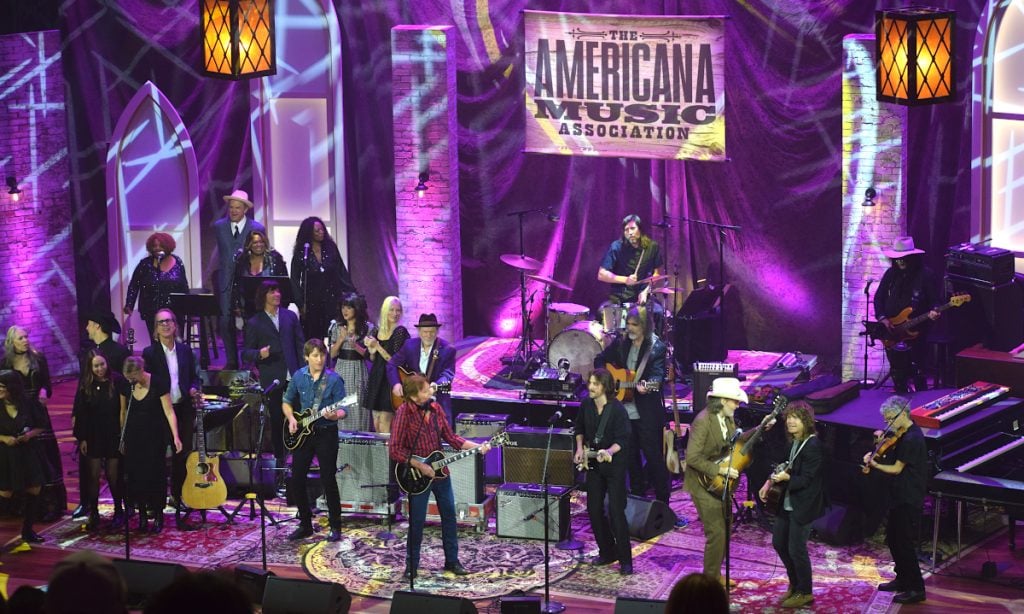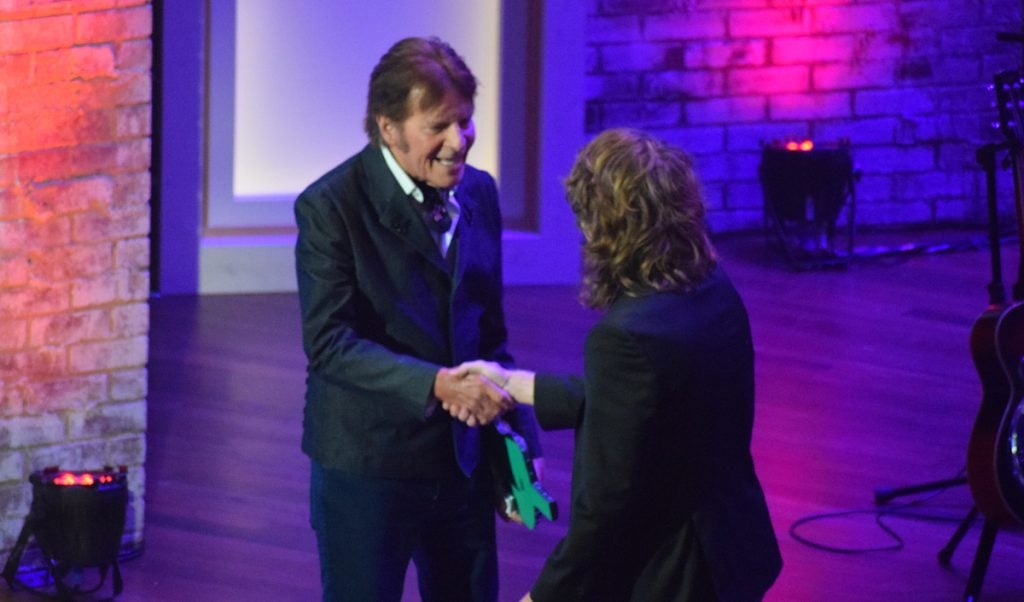Charlie Kirk, Jesse Welles, and the Freedom of Speech

“Life is too short to not say exactly what you mean all the time.”
This is what Jesse Welles said at the conclusion of his short speech accepting the Freedom of Speech Award at the Americana Music Awards held at the Ryman Auditorium in Nashville on Wednesday night, September 10th. He then walked off stage to thunderous applause from the gallery of the Mother Church of Country Music, leaving them with a sentiment that couldn’t have been more poignant.
Unless you’re really dialed into the doings in independent country and Americana, you probably didn’t even know the Americana Music Awards were happening Wednesday night. It was the assassination of Charlie Kirk that dominated headlines and news feeds, as it probably should have. If you were immersed in the doings of Americanafest like many in the independent country/roots industry were Wednesday, you might not have known about Kirk’s death until you got home and caught up with the rest of the world.
There were a lot of sideways glances when the Americana Music Association announced that Jesse Welles would be receiving what was officially a “Lifetime Achievement Award.” Didn’t Jesse Welles really just appear on the scene recently? Sure, he was a roots rock artist previously, but it’s really been the last year when he’s come to prominence. In fact, Welles was also nominated for Emerging Act of the Year, illustrating the rather weird and juxtaposed accolade.
But along with releasing a lifetime’s worth of work compared to most other songwriters over the last year or so, elevating Jesse Welles for his staunch and outspoken use of music as a way to speak truth to power, empower individuals, and put current events into a greater context couldn’t have been more timely and prescient.
The Americana Free Speech Awards is given out in coordination with the First Amendment Center founded by Nashville native John Seigenthaler, and located at Nashville’s Vanderbilt University. It certainly wouldn’t be a radical pronouncement to say that the Americana music world veers left when it comes to American politics. But who was the first to ever receive Americana’s Free Speech Award? That would be conservative firebrand Charlie Daniels.
Many have tried to code Jesse Welles left as well, but that’s an insult to the reputation of the political binary Jesse Welles works within. He’s more anti-war, anti-bigotry, anti-corporations, and anti dumping whatever said corporations are dumping into the food supply and environment, poisoning the population. On many occasions, Welles has made folks on the left squirm with his pronouncements, just as he has people on the right. He’s also appeared on the Joe Rogan Experience, and is a fan of folks like comedian Tim Dillon, who also uses his artistic forum to speak truth to power.
But most importantly, Jesse Welles is sharing his perspective in often forceful and direct ways that are intended to make us all feel uncomfortable about the current state of affairs in our nation and world.
For Charlie Kirk, the assessment of political alignment was much more simple. Conservative and doggedly principled, he became famous for his back and forth with college students on campuses about political issues. But within the clearly politically-slanted forum that he worked in, there was the underlying maxim that everyone should be allowed to speak—and perhaps most importantly—people from across the political divide should speak to each other.
Jesse Welles and Charlie Kirk didn’t really have a lot in common politically—though there was probably more overlap than one might glean from the surface. But the one fundamental thing that undergirded both of their approaches was “Life is too short to not say exactly what you mean all the time.” This isn’t just our right as Americans. This is our responsibility, to ourselves, and each other.
It’s pretty simple. We have entered a late-stage era of American life where political violence, corruption, and a severe level of oligarchy has metastasized throughout society. Those presenting this as an unprecedented moment should recall the 1960s and the Kennedy assassinations, the killing of Martin Luther King, and all the political upheaval and violence of that era. But that was 60 years ago now. The level of political violence is certainly unprecedented in many of our lifetimes.
It was John Fogerty who made the trek to the Country Music Mother Church to give Jesse Welles his Freedom of Speech Award on Wednesday. The two had actually taken the stage at Nashville’s famed Exit/In the evening before to perform together. Wednesday night’s Americana Music Awards concluded with John Fogerty singing a few of the songs from the Credence Clearwater Revival catalog, including capping off the awards with a big singalong on “Proud Mary” that incorporated many of the performers from the evening, including Jesse Welles.

For years, Fogerty wasn’t even able to sing his own songs due to legal restrictions. It wasn’t until a deal was struck with Concord Records in 2023 that Fogerty was finally given that right. He recently re-recorded many of his top songs Taylor Swift-style, and re-released them in an album called Legacy: the Credence Clearwater Revival years.
So yes, John Fogerty doesn’t just know a thing or two about Freedom of Speech via the protest songs he wrote and sang back in the ’60s when he lived through and helped chronicle that period in American history like Jesse Welles is doing today. His whole life John Fogerty has been told what he could and could not sing, legally.

Some love to wax about how all music, and all speech is political in nature. But those that know the true power of music, they know that music’s power ranges much beyond the political. It was former American President Jimmie Carter who once admitted that Bob Dylan had done more to reshape American culture than he ever could. Music has that power because it has the capability of uniting as opposed to dividing.
It’s hard to paint a rosy picture about what the future might hold for the United States. The death of Charlie Kirk could result in reprisal violence. It could be used as a precursor to stifle speech in America, whether it’s through direct action of the government, or the cooling action an assassination has on all of us to think twice before we say what we believe.
But whether your Freedom of Speech hero is Charlie Kirk or Jesse Welles, it should be for all of us to protect our neighbor’s right to “say exactly what [they] mean all the time.” After all, it might be that First inalienable American right—and that First right only—that will help us rise out of this moment, and get the American project back on track before it unravels forever like a ragged old flag.
– – – – – – –
If you found this article valuable, consider leaving Saving Country Music A TIP.


September 11, 2025 @ 10:01 am
Hey Folks,
Going to be out in the field covering AmericanaFest all day. If this comments section descends into flame wars, I’m just going to shut it off due to my limited time to moderate comments, which ironically, would be disrespectful to the idea that everyone should be allowed to speak. So let’s all please be respectful so the discussion can continue. Thank you.
September 11, 2025 @ 1:48 pm
Unfortunately I entered into the comments on the video. Mistake.
September 11, 2025 @ 10:09 am
Just updated with the video Jesse Welles just released about Charlie.
September 11, 2025 @ 10:32 am
He has a way of saying it that utterly lacks the sanctimony and hysterical bad faith I hear from many quarters.
I can’t agree with your opinion on Kirk because his videos were edited to misrepresent his opponents. It was bad faith propaganda and cynical financial opportunism not free speech advocacy. The only good thing I can say about the guy is that he was smart enough to get the joke with South Park and not act like a fool about it.
Jesse is ,of course, right but the irony of all this is that in reality Charlie loved the gun and repeatedly rationalized violence when it was his side doing it or school kids getting shot. To be consistent with his opinion his mourners would have to say that his death was worth it. But they are over the top with violent threats today.
September 11, 2025 @ 10:40 am
I’m no fan of Charlie Kirk’s politics, but plenty of his videos were edited by others to make Charlie look bad or misrepresent him. It went both ways. And that style of video is engrained into this era of quick videos and sound bites. I don’t think his team was doing anything egregious.
And the gun part of your comment feels a bit off. Every 2A supporter believes (vocally or silently) that some gun deaths are inevitable and are a tradeoff to having the 2nd amendment. Charlie at least said it out loud and was honest about it.
September 11, 2025 @ 11:35 am
Oh come on. I wasn’t a fan of his politics but this is ridiculous.
The “bad faith” part is just so lazy and disingenuous. He was famous for showing up to college campuses and having open forum discussions….sitting at a table and inviting anyone to talk to him is the very opposite of “bad faith.”
You can disagree with his views, I disagreed with them a lot, too. The question isn’t whether his views were right or wrong, it’s more about did he genuinely believe them and did he argue for them honestly.
September 11, 2025 @ 12:16 pm
The left has become the speech police and hate. Everyone know this.
September 11, 2025 @ 1:43 pm
The irony of typing this out, while right wing influencers on X/Twitter get MSNBC pundits fired and an NFL PR guy fired for posting insensitive comments about Kirk’s death is hilarious.
My man, both extremes (and yes, Kirk was on the extreme on most issues) play the cancel culture game now. It may have started with far-left liberals on social media, but you are just living on Mars if you think the extreme right wing isn’t happy to partake in “cancel culture” as well.
September 11, 2025 @ 1:51 pm
Good
September 11, 2025 @ 12:03 pm
an american treasure. thank you, jesse welles.
September 11, 2025 @ 10:27 am
That song from Welles was touching. Thank you for posting it.
September 11, 2025 @ 10:31 am
Good article. I hope the comments section stays away from vitriol, and for that hope, I’ll just say for now that I don’t agree with everything you said but I think you did a good job with this article and I agree with the sentiments in the song you posted.
September 11, 2025 @ 10:32 am
The only thing I can say is this: rest in peace, Charley. You were a great man.
I don’t see Charley so much as a champion of “freedom of speech” as I do a champion of freedom of dialogue. What so many on the left despised about him was exactly what made him so powerful—his ability to speak to young people on college campuses in their own language, and to challenge even the most hardline progressive activists to rethink their positions.
It’s easy sing or preach to the choir. It’s another thing entirely to change hearts, minds, and culture. That’s what Charley did. Congratulations to Jesse Welles on his award as well.
September 11, 2025 @ 11:32 am
Just speaking for myself as someone on the left because I think you are mispresenting some of us: I do NOT despise his ability to speak to young people, challenge ideas or engage in debate.
I do despise many (but not all) of his political positions. However, I applaud Charlie for those qualities above and wish the left had someone who had the same talent as Charlie did in that regard.
September 11, 2025 @ 12:54 pm
That’s why I said “so many on the left,” not “all people on the left.” I did hear someone comment today that there are essentially two kinds of Democrats right now: those celebrating loudly, and those celebrating quietly. I don’t personally believe that’s entirely accurate, but I will say this—the sheer number of people who rushed to social media to cheer and gloat is deeply unsettling.
September 11, 2025 @ 10:33 am
Jesse Welles just showed why he won this award.
Bravo, Jesse.
Godspeed, Charlie.
September 11, 2025 @ 10:35 am
Pretty horrific day in 21st century America. And in the middle of all the news, there was a school shooting in Denver.
Charlie’s entire schtick was having debates and talking face-to-face with people he disagreed with. And unlike many political firebrands on TV and in office, he always came across as extremely respectful, polite and even-kneeled.
I count myself as someone who disagrees with so much of his politics. And yet, I am extremely envious of the career Charlie built and wish the Democrat side of the aisle had someone as likeable and engageable as Charlie was. I’ve yet to even mention the young family he leaves behind.
It feels like a fool’s wish, but I hope the temperature of this country calms down, and I hope those who are misguided find help instead of seeking violence.
September 11, 2025 @ 11:57 am
Pretty funny considering Jesse Welles doesn’t say anything. Nothing but platitudes. “Politics sure is crazy huh” is the extent of the insight he’s ever expressed in his music. I’ve tried but I find the praise he gets baffling other than some people just love the complexities of the world reduced to boring cliches
September 11, 2025 @ 12:01 pm
Thank you Trigger. Thank you Jesse. Thank you Charlie.
September 11, 2025 @ 12:15 pm
I posted here two weeks ago warning your readership about the sudden spate of ANTIFA active shooting threats on conservative college campuses. And you chose to censor me.
And now you sit there pontificating about free speech.
Still want accuse me of “culture war” while your side is committing political assassinations on college campuses?
.
I
September 11, 2025 @ 12:43 pm
What is my side? Advocating for traditional country music and independent artists?
September 11, 2025 @ 12:57 pm
You tell me.
How many left wing views do you censor?
How many liberals do you accuse of “culture war” due to the speech they post on your blog?
September 11, 2025 @ 1:09 pm
This comes up all the time.
You can’t see the comments deleted on the left because they’re deleted. Both sides think the other side is being favored. I’m simply trying to run a country music website where folks from across the political spectrum can come and discuss the music.
And trust me. I get accused of being on the right way more than being on the left.
September 11, 2025 @ 2:40 pm
@Trig–I’m sure you’re telling the truth there.
When you step away from the people who normally frequent this site and into the wide world of the Internet and people who get sent here by other sites, I imagine this site is known among millennials (if at all) mostly as “the old raysist white dude who hates on Beyonce.”
September 11, 2025 @ 12:57 pm
Thank god Hank 33 is here to anonymously warn the readers of a music blog about Antifa shootings on college campuses. Call the FBI next time you have a hot tip.
September 11, 2025 @ 1:49 pm
You can always spot the folks who spend too much time on X. God, the brain rot in society from social media alone…
September 11, 2025 @ 12:32 pm
Jesse is so freaking prolific. It’s one thing to be able to spit out poetry with the snap of a finger. It’s another thing to spit out a new melody with the snap of a finger. Now he’s got more complex cord structure going into these songs and they just get better and better.
The Charlie Kirk thing is really disturbing. I know it is nothing new in this world, but some scumbag just completely removed a father from a family. He rationalized many things that likely should not have been rationalized because his brain was so huge and driven by logic, but he sure did touch a lot of lives in a positive way. Shame on all the hate in this country. SHAME!!!!